A couple of years—eternity, by the adolescent calendar—had passed since we’d last stopped at the resort in Minnesota on our way back from Canada. This time, though, seeing Wanda was my number one priority. Sure, I was looking forward to fishing for rock bass in the little river; I even had an idea that I might try flailing away with my piece-of-crap flyrod. But there had been plenty of action up on Lake of the Woods, and Wanda and I had hit it off so resoundingly before … the mind reeled at the possibilities.
Ruby, Wanda’s mom, checked us in. “Is Wanda here?” I asked, trying desperately to convey an impression of disinterested teenage cool.
“You betcha,” Ruby replied cheerfully. “She’s around somewhere. You’re bound to run into her.”
Once we’d settled into our cozy lakeside cabin, Dad and Lars poured several fingers of Wiser’s DeLuxe over ice, pried the lid off a jar of peanuts, tuned in the Twins game on the “wireless,” and dealt cards for gin rummy. I watched them for a while, Dad’s calculated, rational approach contrasting with Lars’ unpredictable hunch-playing.
They kept up a constant patter. “Drug on the market,” Lars would snort when Dad tendered an unappealing discard.
“What a mess,” Dad would complain, fanning his hand. “How can I make chicken salad when you deal me chicken shit?”
Lars took a huge lead with back-to-back no-brainers—“Sacre bleu!,” Dad cried—and I decided to rig my fly rod. I’d made a few feckless casts one evening on Lake of the Woods, with the usual negative results, but thought that maybe I could catch a bluegill or two off the dock. Plus, I might indeed run into Wanda.
A series of narrow, cross-planked wooden docks jutted out from shore. You could see the weedbeds from their T-shaped ends; I knew from previous experience that bluegills, some of them pretty sizable, hung out in their vicinity. A bushy Black Gnat seemed as good a choice as any. I grunted out a cast to the edge of the weeds, let the Gnat lie motionless … and, wonder of wonders, a bluegill came up and smacked it.
The fight was short but spirited—that rod was less a casting instrument than a glorified cudgel—and when I held the colorful fish in my hand I remembered the afternoon Gramps and I had found the bluegill hole at the far end of the lake, how proud and happy I’d been to lug our stringer to the cleaning shack. I caught several nice bluegills—it was great fun to watch them clobber the Black Gnat—but then the pace slowed to a standstill. I couldn’t fathom why they’d turned off so abruptly.
“They won’t bite on a sunken fly.”
The voice startled me. I whirled to behold the most gorgeous creature I’d ever laid eyes on. Skin bronzed by the sun, hair a cascade of spun honey, lean shapely limbs, hips that flared as gracefully as Grecian urns, and breasts like twin planets, their trembling orbits restrained by the clingy fabric of a bright-orange bikini. I had never seen anything remotely like her, not even in the Playboys that my friend Denny kept hidden in the abandoned silo.
But there was more. Hers was not a vain, brittle, Hollywood kind of beauty. You could see the strength in her arms and legs, the confidence in the way she carried herself. She radiated enormous competence. It was easy to imagine her portaging a canoe, replacing a sheared pin, filleting a walleye. Or at least it was easy for me. And it was easy to imagine doing anything for her: stealing from Mom’s purse, getting a tattoo, running away to join the circus—whatever it took.
And then it hit me: I know this girl.
Oh my God! Wanda hadn’t changed; she’d metamorphosed. There was nothing straight or sharp left on her body—it was all curves. Little Orphan Annie had been transformed into Little Annie Fanny. Her face, too, was barely recognizable. There was a tight set to her mouth, and her eyes were grayer than I remembered. It was as if, when the the gawky, angular Wanda had disappeared, the giggly, carefree Wanda had vanished as well.
“Hi, Wanda,” I stammered.
“Hi,” she said flatly. Not a flicker of recognition registered.
“It’s Tom Davis,” I offered. “From a couple summers ago.”
“Uh-huh.” She gave me a look I knew, a look of bored disdain that said Get lost, little boy. Now, I was just another smitten punk she didn’t have the time of day for, another pimply geek who needed to be put in his place.
There was nothing left to say, but Wanda broke the silence.
“If your fly doesn’t stay on the surface,” she said without inflection, “they won’t hit it.”
I’d forgotten all about fishing.
“What? Oh, yeah,” I mumbled.
Wanda turned and walked away. In a daze, I stripped in the Black Gnat, squeezed it dry against my shirt, and started casting again. Wanda was right: as long as the fly balanced on its hackles, it caught bluegills. I stood there on the end of the dock, going through the motions, catching bluegills, thoroughly miserable. I felt like I was standing at the end of the world.
Then, unannounced, Wanda materialized on the next dock to my left. She held a flyrod in her right hand. Without so much as a glance in my direction, she began casting. I tried to ignore her, tried to keep fishing, but I was mesmerized. Wanda cast beautifully, as I somehow knew she would. At her touch the rod came alive. Her timing was exquisite. Always, the line straightened in the air behind her like a taut cable; always, it unfurled immaculately as it arrowed toward the target. Her casting was effortless and efficient and artful, everything mine wasn’t.
She was using a sponge rubber spider, orange like her bikini, and she flicked it with uncanny accuracy into the open pockets of the weedbed. Most of the time a strike followed immediately; when it didn’t Wanda worked the line enticingly with her left hand, making the spider shimmy and dance until a bluegill lost control. She played her fish quickly and expertly, and released them all.
The strange thing was that Wanda displayed no indication that she was enjoying herself. She didn’t smile, didn’t laugh, didn’t whoop it up. She was coldly precise and technical, like a surgeon—or an assassin. It was as if, at the age of 15, Wanda had done and seen it all, and was no longer capable of surprise, delight, or common emotion.
Finally, Wanda reeled in. Our eyes met briefly, but there was no feeling behind that gray gaze. My last image of Wanda is her walking away beneath the gleaming white birch trees, the muscles flexing in her hard, tanned calves, her golden hair brushing against the small of her back, fly rod tucked under her arm.
A few years ago, while traveling through northern Minnesota, I detoured from my planned route. I suddenly wanted to see the resort again, just for memory’s sake. The little river still flowed cool and clear beneath the county highway; upstream, it still widened between rippling mats of lily pads before spreading into the bowl of the lake. The water was just as blue as I remembered it.
The gravel lane still wound through a grove of tall white birch, too, but now a stern warning was tacked to one of them: PRIVATE PROPERTY: DO NOT ENTER. A different sign conveyed the message that the lane now led to some kind of church camp.
Feeling as if I’d already gotten religion, I turned around and drove away.




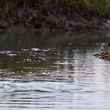

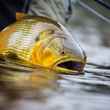
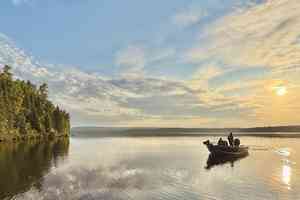


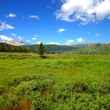
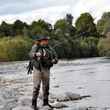
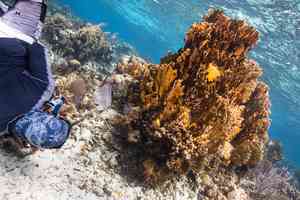

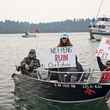
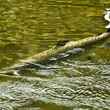




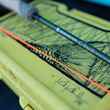



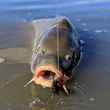
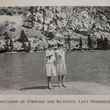
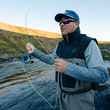
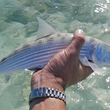
Comments